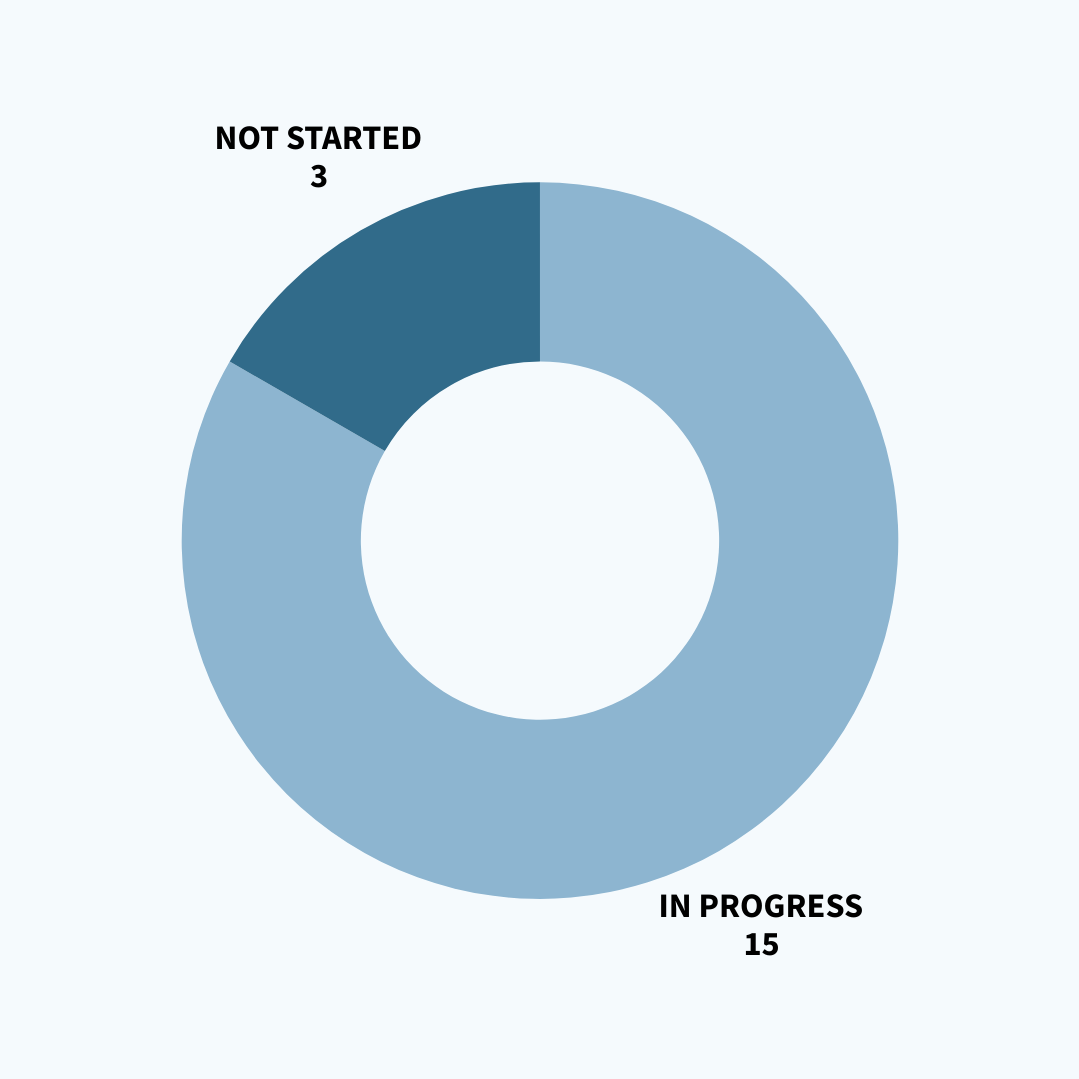Portland Progress

Transportation and Land use
15 IN PROGRESS
3 NOT STARTED
(updated January 2025)

Support efforts to “Make Transit Easier,” “Expand Local Connections,” and “Introduce Rapid Transit” in alignment with the Transit Tomorrow vision for the PACTS region.
Status: In Progress
Update:
- Supported and participated in PACTS’s Transit Together and Gorham-Westbrook-Portland Rapid Flow Transit Study (2022/2023). Supporting the rollout of transit signal priority, which began deployment in 2024 and is anticipated to be complete by early 2025 on Forest Ave, Washington Avenue, and portions of Congress Street and Brighton Avenue. Continue advocating for increased state funding for multimodal projects.
- METRO enhanced and streamlined several transit routes in 2024 to make them more efficient and/or provide increased frequency (this includes the #7 and #5 routes).
- South Portland Bus Service (SPBS) merged into METRO in late 2024 to advance the ‘Make Transit Easier’ strategy.
Transformative potential: Equitable, regenerative, resilient
Key Milestones: Roll-out of coordinated measures (portal, schedules, etc.) by 2025; all specified updates to transit stops implemented by 2028; METRO and SPBS achieve carbon neutrality by 2040
Strengthen the cities’ transit-oriented development nodes to support travel by walking, biking, and public transportation.
Status: In Progress
Update: Identified land use policy opportunities around TOD through ReCode Phase II’s land use code evaluation (2021). Released drafted TOD zoning language in ‘first wave’ of ReCode Phase II changes for public review (2023). Adopted new land use code, including two ne TOD zones, with a range of permitted uses, significant heights, and no density limits, and mapped these zones on to various transit nodes (2024).
Transformative potential: Equitable, regenerative, resilient
Key Milestones: New/updated TOD TIF districts implemented by 2026
Make biking easier through a complete network of bikeways and through building an inclusive biking culture.
Status: In Progress
Updates:
- Neighborhood Byways: Additional planning to facilitate Bayside Trail construction from Elm to Brattle St, North Deering Byway construction of Milliken Brook byway segment (2022) and Canco Road segment (2024), and PTC Neighborhood Byway construction (2020). Design is nearing completion for the Union Branch Pathway with construction to begin in 2025; Route Selection has been completed for the Libbytown Pathways segment from Park Avenue to the Fore River Parkway Trail.
- Shared Use Pathways: Initiated concept design for Baxter-Bates-Veranda St Bikeway/East Coast Greenway; Conducted analysis of potential higher quality bike lane locations (2021). Completed designs of enhanced bike lane facilities on Deering Avenue and a short portion of Brighton Avenue (2023); Brighton Avenue segment was implemented in 2024. Bike lanes extended on Stevens Avenue (2024). Completed West Commercial St Pathway Phase II (2023), and was awarded funding by Maine DOT for Phase III with design to begin in 2025. Applied to PACTS Connect 2050 Long Range Plan for inclusion of an additional 8 miles of shared-use pathways and an additional 8 miles of separated bike lanes (2024). As part of a Water Resources project, implemented enhanced bike lanes on Baxter Boulevard (2023) and extended buffer bike lanes to its entirety (2024).
- Portland Bike Share Program: Completed pilot year of the Bike Share program; in the 3½ month season in 2022, there were 4,900 rides total (2022). Season two of the Bike Share program consisted of 11,400 rides, with 7,500 being pedal bikes and 3,900 being electric assist bikes (2023). Season three of the Bike Share program concluded November 30th with a full 7-month program.
Transformative potential: Equitable, regenerative, resilient
Key Milestones: Bikeway network plan completed and implementation begun by 2026; 5% of all trips completed by bike by 2040
Create safer and more accessible travel for people of all ages and abilities by all modes of transportation by adopting “Vision Zero” for the PACTS region and continuing to expand complete streets.
Status: In Progress
Updates:
- Completed enhanced project scoping for Forest Avenue from Woodfords Corner to Exit 6 (2024). Recommendations are to implement a road diet, add buffered bike lanes, and add enhanced pedestrian crossings at a number of locations.
- Completed construction of Somerset St Reconnection/Bayside Trail Extension (2022).
- Continuing preliminary design for Smart Corridor for Morrill’s Corner on Forest Ave, preliminary design completion expected in 2025.
- Vision Zero: PACTS began public outreach and goal-setting for the regional Vision Zero project (2022). GPCOG submitted a Vision Zero/Safe Streets for All planning grant to FHWA with several Portland project elements.
- Franklin Street: Staff presented a scope of work and approach to the Portland City Council to update the 2015 conceptual design of Franklin Street to better reflect state of the art Complete Street/active transportation design standards. RFP released for transportation design and land use/urban design services (2024). Consultant selected and the project is anticipated ot begin in February 2025. MaineDOT and City of Portland submitted Reconnecting Communities Pilot grant application for preliminary design for $2M including local match of $500,000 to be split between Portland and MaineDOT.
- Libbytown Safety and Accessibility Project: City of Portland and MaineDOT awarded a Reconnecting Communities $28M grant from the federal government for preliminary design for Libbytown Safety and Accessibility Project (2024).
- The MaineDOT and the Roux Institute was awarded a RAISE grant for $25M of a toal project cost $35M.
- Began enhanced project scoping for Brighton Ave Multimodal Project intersection project at Rosemont Corner (2024).
- Completed construction of Somerset St Reconnection/Bayside Trail Extension, Elm St to Brattle St (2022), now planning for extension from Brattle Street to State Street.
Transformative potential: Equitable, regenerative, resilient
Key Milestones: Complete Streets Design Manual produced by 2025
Partner with PACTS, GO MAINE, and large public and private employers in the cities to continue to promote more efficient or zero-emissions commuting and to establish a Transportation Management Association (TMA) for the Greater Portland region.
Status: In Progress
Update: Began buildout of Transit Demand Management (TDM) resources website for use by TDM coordinators (2021). Modifying standards for TDM plans in the Technical Manual; continuing efforts to streamline the TDM plan development and gather TDM monitoring reports on an annual basis (2023).
Transformative potential: Equitable, regenerative, resilient
Key Milestones: Working Group for TMA convened by 2024; TDM plans updated/adopted by 2026
Shift existing incentives that lead to more parking demand and supply to instead facilitate and strengthen multimodal transportation options.
Status: In Progress
Update: Eliminated parking requirements for significant portions of the city through ReCode Phase I; Added EV parking requirements to the city’s Technical Manual (2021). Adopted parking maximums within the land use code (2024).
Transformative potential: Equitable, regenerative, resilient
Key Milestones: Zoning ordinances revised with new parking requirements by 2028
Plan for future growth in our cities by committing to land use principles for a smaller carbon footprint, codified in the Cities’ comprehensive plans, zoning, and subdivision ordinances.
Status: In Progress
Update: Streamlined Accessory Dwelling Units (ADU) Policy; Initiated work on ReCode Phase II to incorporate One Climate Future’s land use goals as a foundational element (2021). Participated in NYU’s Housing Solutions Lab Peer Cities Network as a means of expanding access to resources on housing policy (2022). Released ‘first wave’ of draft ReCode Phase II changes in June 2023, including a series of amendments to residential and mixed use zoning to promote more housing and more complete neighborhoods, density along transit corridors and in mixed-use nodes (2023). Adopted new land use code that allows up to four units (plus two ADUs) within mainland residential zones, and eliminated density standards and increased heights in most mixed-use zones (2024).
Transformative potential: Equitable, regenerative, resilient
Key Milestones: Housing stock meets workforce demand within the cities by 2035: Anyone working in the cities can live within the cities by 2035
Expand electric vehicles (EV) charging infrastructure in public and private parking through public investments in chargers, updates to city land use codes, and EV-ready requirements in the state building code.
Status: In Progress
Update: Added 15 new networked L2 EV chargers (2021). Met milestone 20% of spaces in new garages (2022). Installed neighborhood charging hubs at East End Community School and Deering Oaks Parking Lot, the first four DC fast chargers at the corner of Spring Street and High Street, and eight EV chargers at the Homeless Service Center (2023). Four additional DC fast chargers to be installed in 2025.
Transformative potential: Equitable, regenerative, resilient
Key Milestone: 20% of spaces in new garages required to have EV chargers (per land use code) by 2026; 5% of parking spaces in all lots and garages in the cities have level 2 EV chargers by 2030
Offer excise tax exemptions for electric vehicles (EVs), and advocate for additional state EV incentives.
Status: In Progress
Update: Provided discounts for installing home EV chargers with our Electrify Everything! program (2022). Continuing to promote state rebates and federal tax incentives for new and used EVs.
Transformative potential: Equitable, regenerative, resilient
Key Milestone: 30% of new light duty vehicle sales are electric vehicles by 2030; 60% by 2040; 100% by 2050
Work with Greater Portland METRO and the South Portland Bus Service to transition all bus fleets to battery-electric vehicles (BEV) by 2040.
Status: In Progress
Update: Greater Portland METRO and the South Portland bus service merged in 2024. The organization has a goal to operate a zero-emissions fleet by 2040.
Transformative potential: Equitable, regenerative, resilient
Key Milestone: All new METRO and South Portland bus purchases are electric starting in 2025; all-electric METRO and SPBS fleets by 2040
Develop an electric and alternative-fuel vehicle capital transition program for municipal and school vehicles.
Status: In Progress
Update: Leased four new EV Konas; initiated City Hall EV carshare program (2021). Receiving technical support from the U.S. Department of Energy to develop a zero-emissions municipal fleet strategy (2024).
Transformative potential: Equitable, regenerative, resilient
Key Milestone: All new school bus purchases are electric by 2025; all new light-duty vehicles purchases are electric by 2032; zero-carbon municipal fleets by 2040
Expand the use of shared electric vehicles, promote electric vehicle use by taxis and other vehicle-for-hire companies, and set a requirement that by 2030 all rideshare vehicles must be electric vehicles.
Status: Not Started
Update: None
Transformative potential: Equitable, regenerative, resilient
Key Milestone: All Transportation Network Company rideshare vehicles are electric vehicles by 2030
Implement changes to curb and parking designs to incentivize shared autonomous vehicles, and advocate for state requirements that any autonomous vehicles must be electric and shared.
Status: Not Started
Update: Mid-term Strategy
Transformative potential: Equitable, regenerative, resilient
Key Milestone: State requirement that all autonomous vehicles be electric in place by 2030
Reduce vehicle idling through anti-idling policies, vehicle technology, and improved intersection design.
Status: In Progress
Update: Implemented smart traffic signals that reduce idling through RapidFlow technology (2021). Exploring potential to expand smart traffic signals.
Transformative potential: Equitable, regenerative, resilient
Key Milestone: Anti-idling policies to be updated and enforced by 2025*
*Portland-specific milestone
Partner with large stakeholders in the freight sector to encourage development of a Sustainable Freight Action Plan.
Status: Not Started
Update: Long-term Strategy
Transformative potential: Equitable, regenerative, resilient
Key Milestone: Regional Sustainable Freight Action Agenda drafted by 2032; statewide Sustainable Freight Action Plan developed by 2035
Work with Casco Bay Lines to transition it fleet to hybrid-electric ferries, and to consider a ferry route connection between Portland and South Portland.
Status: In Progress
Update: Casco Bay Lines designed and approved a hybrid ferry service (2021).
Transformative potential: Regenerative, resilient
Key Milestone: 60% of ferries (three ferries, based on the current fleet of five) run on all electric power by 2035
Commission an engineering study for shore power hookups to allow and eventually require docked ships to connect to electrical service.
Status: In Progress
Update: Long-term Strategy; Study is complete (2024).
Transformative potential: Regenerative, resilient
Key Milestone: Shore power for full ferry fleet installed by 2040; shore power for cruise ships installed by 2040
Reduce greenhouse gas emissions from the Portland International Jetport through benchmarking and tracking, and through decarbonizing ground vehicles.
Status: In Progress
Update: Portland International Jetport installed ten EV charging stations in the public parking garage and purchased two EVs for Jetport’s Operations and Administration (2022). In 2023 the Jetport received its first electric aircraft pushback tug in cooperation with United Airlines. The Jetport installed the ramp charging station for the pushback tug, which replaces the diesel tug used previously by United. Additionally, the Jetport made headway on the electrification of its vehicle fleet with the addition of two electric trucks (F-150 lightings), two electric service vans, and one plug-in hybrid pool vehicle. Upcoming improvements include the replacement of five passenger boarding bridges equipped with preconditioned air that will provide preconditioned air to dramatically reduce fuel and energy use and eliminate the need for aircraft at these gates to run jet fuel-powered auxiliary power units or diesel heating units. (updated December 2023)
Transformative potential: Regenerative, resilient
Key Milestone: “Neutrality” achieved by 2030 under the Airport Carbon Accreditation framework


